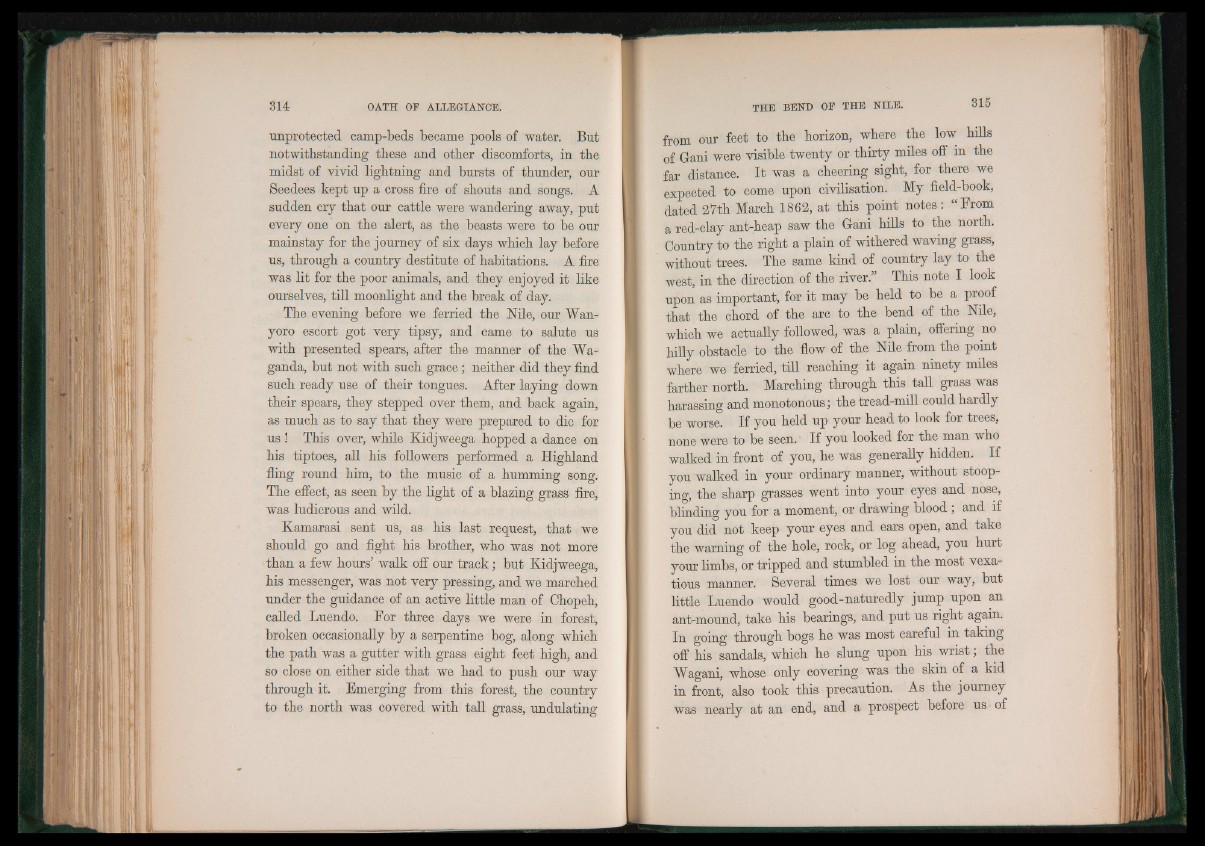
unprotected camp-beds became pools of water. But
notwithstanding these and other discomforts, in the
midst of vivid lightning and bursts of thunder, our
Seedees kept up a cross fire of shouts and songs. A
sudden cry that our cattle were wandering away, put
every one on the alert, as the beasts were to be our
mainstay for the journey of six days which lay before
us, through a country destitute of habitations. A fire
was lit for the poor animals, and they enjoyed it like
ourselves, till moonlight and the break of day.
The evening before we ferried the Nile, our Wan-
yoro escort got very tipsy, and came to salute us
with presented spears, after the manner of the Wa-
ganda, but not with such grace; neither did they find
such ready use of their tongues. After laying down
their spears, they stepped over them, and back again,
as much as to say that they were prepared to die for
us ! This over, while Kidjweega hopped a dance on
his tiptoes, all his followers performed a Highland
fling round him, to the music of a humming song.
The effect, as seen by the light of a blazing grass fire,
was ludicrous and wild.
Kamarasi sent us, as his last request, that we
should go and fight his brother, who was not more
than a few hours’ walk off our track; but Kidjweega,
his messenger, was not very pressing, and we marched
under the guidance of an active little man of Chopeh,
called Luendo. For three days we were in forest,
broken occasionally by a serpentine bog, along which
the path was a gutter with grass eight feet high, and
so close on either side that we had to push our way
through it. Emerging from this forest, the country
to the north was covered with tall grass, undulating
from our feet to the horizon, where the low hills
of Gani were visible twenty or thirty miles off in the
far distance. It was a cheering sight, for there we
expected to come upon civilisation. My field-book,
dated 27th March 1862, at this point notes: “ From
a red-clay ant-heap saw the Gani hills to the north.
Country to the right a plain of withered waving grass,
without trees. The same kind of country lay to the
west, in the direction of the river.” This note I look
upon as important, for it may be held to be a proof
that the chord of the arc to the bend of the Nile,
which we actually followed, was a plain, offering no
hilly obstacle to the flow of the Nile from the point
where we ferried, till reaching it again ninety miles
farther north. Marching through this tall grass was
harassing and monotonous; the tread-mill could hardly
be worse. If you held up your head to look for trees,
none were to be seen. If you looked for the man who
walked in front of you, he was generally hidden. If
you walked in your ordinary manner, without stooping,
the sharp grasses went into your eyes and nose,
blinding you for a moment, or drawing blood ; and if
you did not keep your eyes and ears open, and take
the warning of the hole, rock, or log ahead, you hurt
your limbs, or tripped and stumbled in the most vexatious
manner. Several times we lost our way, but
little Luendo would good-naturedly jump upon an
ant-mound, take his bearings, and put us right again.
In going through bogs he was most careful in taking
off his sandals, which he slung upon his wrist, the
Wagani, whose only covering was the skin of a kid
in front, also took this precaution. As the journey
was nearly at an end, and a prospect before us of